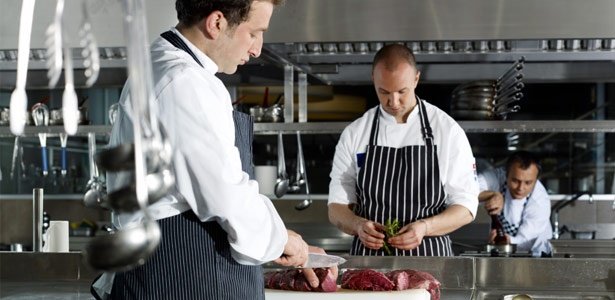The chef industry is becoming understaffed due to students finding themselves ill-equipped in the real world of cheffing.This is a growing problem in the restaurant industry that is affecting consumers as well. Can it be fixed?
Graduates are finding their skills less refined amongst the high standards in a real restaurant kitchen.
Other reasons include: long working hours accompanied by low pay, restaurants with a lack of chefs to employ, chefs desiring the general running of a restaurant rather than the running of a kitchen, and lastly- studies are expensive and students are getting more theory than kitchen time.
What the experts say
Renowned South African Chef Reuben Riffel, owner of the well-known Reuben’s, says that “We need a better system and quality of training for students that cannot afford the good schools. Currently those that study at the best schools don’t always follow through on staying in the industry because they have more options” an issue that is too affecting the decrease in employable chefs.
I had a recent conversation with Renshaw Adams, the Executive Chef and partner of PIKANT catering and events. He agreed that more practical time would be beneficial to give students more experience in working long hours, under extreme conditions.
He says “They are not trained properly for what is to come when they start working, the school only teaches them the basic skills, they learn most of their skills in the kitchen. The more they work, the more experience they get!”.
Adams also stated that he worked very hard to get where he is now; he started out at home and took his skills into the workplace with no past studies or degree. He was first a kitchen-hand when he jumped right in and worked his way up the ladder.
What does a chef earn?
Many graduates want to start big and earn a large salary without gaining any real experience beforehand. The basic salary of an Executive Chef is about R239 983 per year, a Head Chef is earning about R140 532 per year, a Sous chef about R104 261 and a Chef de partie R 74 008 per year – not such high numbers if you consider the working conditions.
If salaries are increased, menu prices will have to be increased as well and customers will be unhappy having to spend more on a meal than they usually do.
The kitchen life is not at all as glamorous as it is made out to be. Reality cooking shows give a false view on what can be expected when going into the industry. Being a chef is more of a blood, sweat and tears job and most definitely will not make you famous overnight!
Consumers have no idea what is happening behind the kitchen doors. The shortage of chefs has in fact been an issue for quite a while now according to a meeting I had with Chef Reuben Riffel. Many new restaurants are opening, not just the high-end ones, and because of this expansion, the demand for chefs is growing.
What does this all mean?
The shortage means that young chefs are being placed in positions far above their capabilities, leading to food being served of a lesser quality because certain basic skill-sets have not been perfected. In the long run this shortage could lead to the closing down of businesses.
Being a chef is not just about cooking. A creative, mentally stable mind with fresh, innovative ideas is essential – as well as someone who can keep up with demanding work hours and know how to manage money.
What can be done
Changes in terms of the work environment will have to be made in order to better the situation. Changes such as adding health insurance as a benefit, increasing salaries and menu prices, offering more internships in order to better skills within the workplace and ensuring an overall good working environment for staff.
Start-up chefs need to know exactly what will be expected of them when they begin to work professionally. If changes aren’t made, in the long-run an ongoing crisis could ultimately lead to chaotic kitchens, lower quality service and menu options and the closing down of restaurants.

